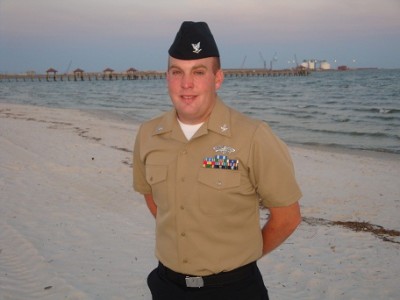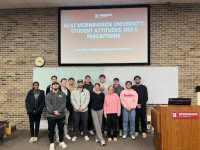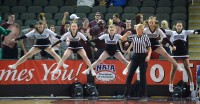 By Claire De Roin–
By Claire De Roin–
Andrew Sedivy won’t talk about the things he saw and did in combat. He served two overseas tours with the United States Navy. Sedivy, 23, served eight-month tours in both Iraq and Afghanistan.
Sedivy explains that combat veterans usually don’t talk about their experiences. “Most vets don’t talk about it because you have to live it to truly understand the burden and pain some of us carry.”
“Military life isn’t just a friendship between people at the same job. It’s a family –dysfunctional at times — but those brothers I served with would be here at my side at the drop of a hat if I called on them,” Sedivy says. “That’s just what we do. It’s an unwritten code: one team, one fight.”
While students around campus may complain about their roommate or how late they were up doing homework the previous night, people our age are halfway across the world serving in combat zones. Once young adults enter college institutions, the majority of them become absorbed in their own “troubles.” In comparison to real world danger, however, having an hour or two of homework isn’t that bad.
“‘Live every day to the fullest because it might be your last,’” is a saying so many college kids say. If you have never been in a situation or place where your life could end any day, then you will never understand the meaning of that saying,” Sedivy says.
 When Sedivy was 19, the age of college freshman and sophomores, he was a gunner for a convoy security team running missions six days a week. He and his team lived out of their trucks for six months. At the same time this was happening, Sedivy was completing two college courses, spending his few hours of rest time doing homework. “That’s a work load,” Sedivy says, “not deciding, ‘Do I go to the bars or do my homework?’”
When Sedivy was 19, the age of college freshman and sophomores, he was a gunner for a convoy security team running missions six days a week. He and his team lived out of their trucks for six months. At the same time this was happening, Sedivy was completing two college courses, spending his few hours of rest time doing homework. “That’s a work load,” Sedivy says, “not deciding, ‘Do I go to the bars or do my homework?’”
Professors may seem strict while grading papers and class attendance, but they’re nothing compared to commanding officers in the military.
“It’s a habit that dies hard,” Sedivy says of military life. “It’s hard going from being in charge and being able to fix a situation there on the spot to having to worry about hurting feelings.”
If you know a combat veteran, Sedivy says, “shake their hand, hug them, and tell them ‘I’m proud to know you and thank you for what you did.’ That will mean more to them than anything.”
While originally from the Sioux City area, Sedivy is currently working in Cozad, Nebraska, as an equipment operator working with fiber optic communications. “When I see a flag to this day,” he says, “I get butterflies. I’m a combat veteran and very, very proud to be.”






Leave a Reply